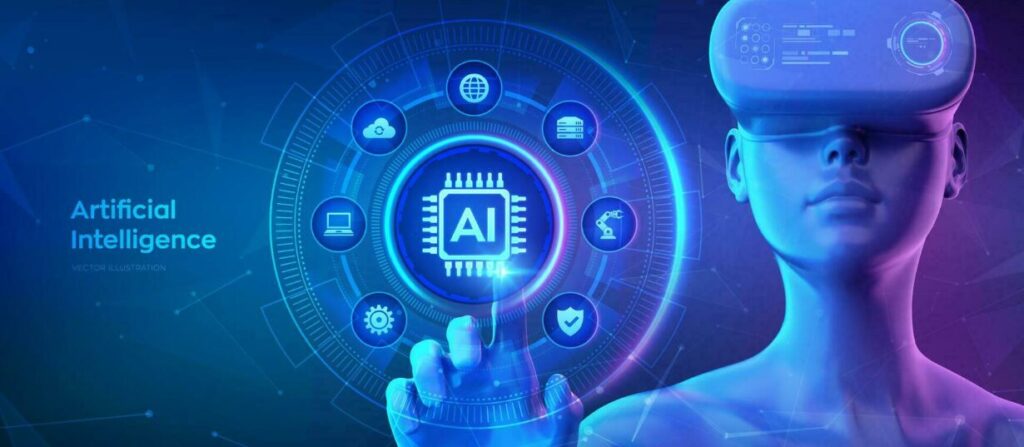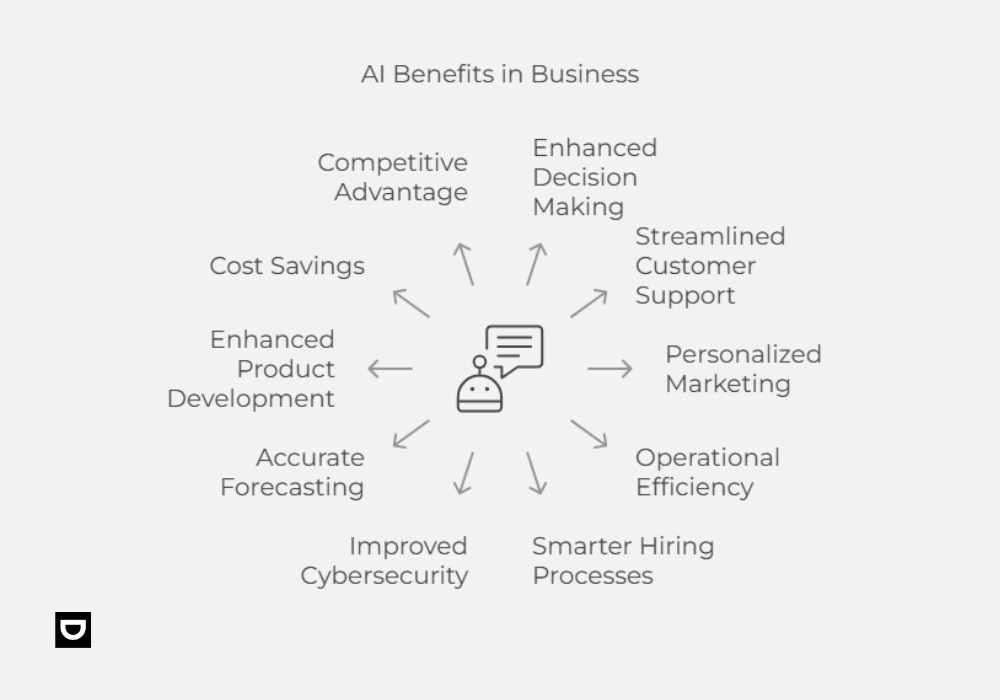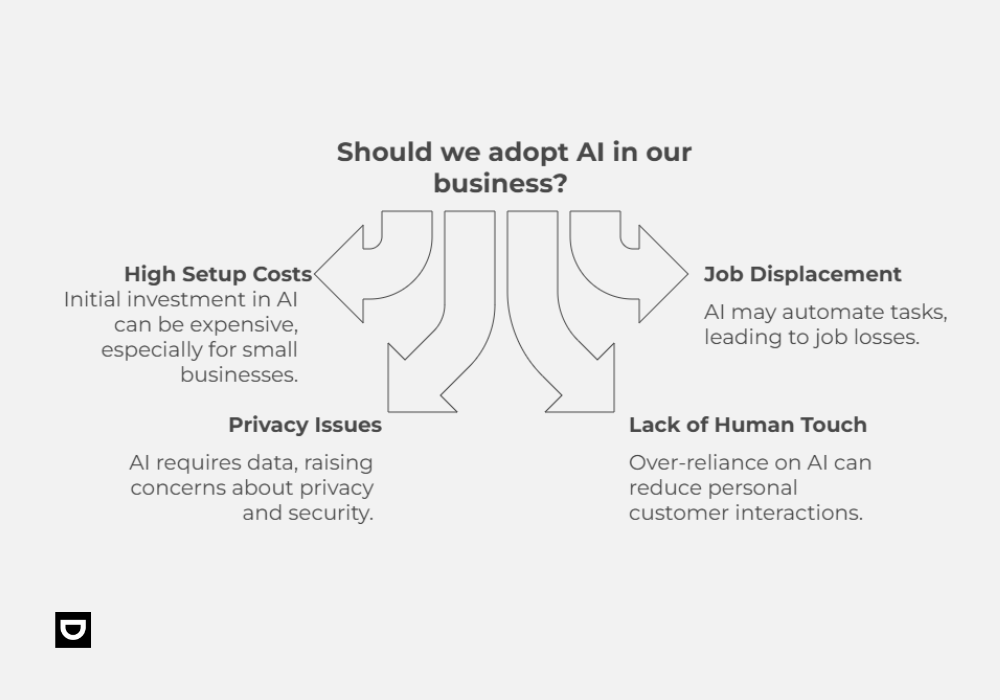April 29, 2025
10 Powerful Benefits of AI in Business You Should Know
Why do you think most businesses are constantly on the hunt for tools (not just AI tools) that can streamline their operations, boost their productivity, and ultimately drive growth?
As the world changes quickly, Artificial Intelligence (AI) is becoming a powerful tool for businesses. Tools like Dumpling AI have easily emerged to show that even complicated and repetitive tasks can be made easier with smart automation, helping companies save time and work more efficiently.
Key Takeaways
- Understand what Artificial Intelligence (AI) really means.
- Discover real-life examples of how businesses are leveraging AI today.
- Learn the top 10 benefits of using AI in business operations.
- Find out whether small businesses can also tap into the power of AI.
- Discover the major drawbacks and challenges of using AI in business.
Let’s dive into a brief definition of what AI is truly about.
What is Artificial Intelligence?

Artificial intelligence (AI) is all about using smart tools that help people and businesses automate their tasks, collect and understand large amounts of data to make data-driven decisions, and leverage human-like capabilities such as learning, decision-making, and even understanding language to boost efficiency, spark new ideas, and support growth.
Businesses today are swimming in data. AI helps businesses better understand their customers by analyzing their behavior and predicting what they might do next, which leads to smarter sales and marketing strategies. Examples of AI in action include Salesforce, which integrated AI into its CRM platform through Einstein AI, and Walmart, which uses AI to manage its inventory more effectively by predicting what customers will need before they even walk into a store, improving the shopping experience of its customers while reducing waste and costs.
By making certain procedures and tasks quicker and more precise, AI frees up people’s time to focus on the creative and strategic tasks.
Up next are only a handful of the reasons why artificial intelligence’s ten benefits are felt across most industries, and why smart tools like Dumpling AI could be the game-changer your company needs.
10 Benefits of Using Artificial Intelligence in Business

1. Enhanced Decision Making
The keyword here is “speedy decision-making.” This is because AI thrives on data. It can easily and quickly sift through massive volumes of information, spot most-to-all relevant trends, and deliver insights that are often invisible to the human eye. Dumpling AI, for example, helps teams make faster, smarter decisions by handling data analysis, so planning becomes quicker and more effective.
2. Streamlined Customer Support
Customer service has been transformed by chatbots and AI-powered assistants, which can answer questions and attend to inquiries around the clock, provide prompt answers, and learn to provide even better answers over time, resulting in happier customers and less strain on the human support staff.
3. Personalized Marketing
AI excels at personalization. It is capable of creating hyper-targeted advertising by analyzing user behavior, preferences, and history. The use of AI takes a step further by assisting companies in tailoring their communications in a distinctively authentic and human tone, hence increasing their engagement and conversion over time.
4. Operational Efficiency
As a business, automating monotonous and time-consuming operations with AI tools allows your human staff to dedicate more time to efficiently focus on strategic, high-value tasks. The use of AI capabilities to create reports, summaries, and even creative material can result in increased productivity while reducing human staff fatigue.
5. Smarter Hiring Processes
With AI tools, staffs in the HR department can easily scan resumes, score applicants, and analyze video interviews for tone and keyword usage (simply put it makes the hiring of new candidates easy and faster), and when combined with the AI’s natural language processing skills, HR departments can build a better and more diverse teams faster.
6. Improved Cybersecurity
With AI, irregularities in systems can be swiftly detected in real-time, identifying potential risks before harm occurs. This enables significantly reduced response times, especially when AI aids in creating real-time security policies or incident reports.
7. Accurate Forecasting
Businesses can use AI models to forecast certain variables from consumer demand to possible supply chain bottlenecks. This can be taken further when partnered with the language style of certain smart tools to make more predictions that become digestible insights for the whole team to comprehend and efficiently act on.
8. Enhanced Product Development
Companies can use AI-driven data analysis to uncover which features their consumer like, what is lacking, and what the competition is up to. The use of AI helps various departments express these findings more clearly and efficiently at record times, too.
9. Cost Savings
Businesses can use AI to eliminate the need for physical labor in repeated operations while minimizing mistakes. It also can automate high-quality content generation and summarization has the potential to significantly reduce marketing and communications departments’ costs.
10. Competitive advantage
In an economy where innovation is key, businesses that adopt the use of AI tools have a significant advantage, especially with such a smart tool on your side; you’re not just employing AI; you’re making it a conversational companion, aide, strategist, and content generator all in one.
Real-life examples of how businesses are leveraging AI today
Let’s look at two real-world instances:
Uber’s Dynamic Pricing and Route Optimization
“Uber’s success isn’t just about having an app and a fleet of drivers — it’s about how the company uses machine learning to turn complex logistics into smooth experiences. By analyzing massive amounts of real-time data, including traffic flow, weather conditions, historical ride patterns, and current demand, Uber’s AI helps determine optimal pricing and routing decisions in the blink of an eye.
For example, during peak hours or when rain begins to fall, the system dynamically adjusts fares to balance supply and demand, ensuring that riders can still find available drivers and that the drivers are incentivized to stay on the road. Meanwhile, the AI-powered route optimization helps drivers avoid bottlenecks, reducing travel time and improving fuel efficiency.”
This kind of intelligent orchestration isn’t just a technical achievement; it’s a practical, real-world application of AI that enhances everyday life.
Starbucks’ DeepBrew AI
“With the use of the Starbucks mobile app, you might notice something subtle but powerful: your favorite drink seems to pop up at just the right time, or a personalized offer lands in your inbox that feels like it was made just for you. That’s not a coincidence. DeepBrew, Starbucks’ proprietary artificial intelligence engine, is working quietly behind the scenes.
The DeepBrew AI is designed to enhance the customer experience by learning from each customer’s behavior. It analyzes purchase history, seasonal trends, and personal preferences to recommend suitable drinks and food items you’re most likely to enjoy. The more you interact with the app or make purchases, the smarter DeepBrew becomes, fine-tuning its suggestions to match your taste.
But the impact doesn’t stop with personalization. DeepBrew also plays a crucial role in operations. It helps local stores manage inventory by predicting what items will be in demand, reducing waste, and keeping the most popular products in stock. It even supports targeted marketing, ensuring promotions are relevant and engaging for each customer”.
For Starbucks, AI isn’t just about technology: it’s about creating a more meaningful connection with its customers.
Can Small Businesses Also Benefit from AI?
Of course. AI can help you (and your business) even if you’re not a tech titan. To achieve more with less, a lot of small businesses are already adopting the use of AI tools and systems.
Suppose you own a little internet-based apparel business. AI can come into play to assist you in making product recommendations based on what your customers have looked at, purchased, or even simply lingered over. Additionally, AI can also assist in managing your customers’ emails and support enquiries – sounds like working smart, right? And for small businesses, where time and staff are often limited, that kind of smart support can make a world of difference.
As AI steps in to fill the gaps, doing most of the behind-the-scenes work while owners focus on growing their business.
What Are the Disadvantages of AI in Business?

While AI brings a lot of exciting opportunities, it’s just as important to be aware of the potential downsides before your business dives in. Being aware of the downsides could help keep you abreast with the right information to make a better and more informed business decision and prepare for any possible risks that lie ahead.
1. Displacement of Jobs
As AI takes over certain career options with repetitive tasks, some roles may no longer be needed (epic corporate downsizing). This shift can cause uncertainty and concern among employees, even though it might also open doors to new job opportunities in the long run.
2. Privacy Issues
AI needs a lot of data to work effectively, and that raises some serious questions around privacy and security. It’s crucial for businesses to not only protect user data but also stay compliant with evolving data protection laws.
3. Lack of Human Touch
Not all customer interactions should be automated. As excessive dependence on AI can have impersonal touches on different experiences, which may have an effect on customer satisfaction.
4. Errors and Bias
AI systems are trained on data — if that data is biased, flawed, or broken, the AI can make biased, incorrect, or incomplete decisions. Hence, it requires regular monitoring and ongoing updates to help avoid these problems.
Conclusion
AI is changing the way businesses operate, whether it’s improving decision-making, speeding up or automating tasks, or personalizing customer interactions. The ten benefits of AI are becoming impossible to ignore, especially with tools like Dumpling AI leading the way in smart automation.
From large corporations like Walmart and Salesforce to small startups, AI is helping businesses of all sizes do more with less. And while the advantages are amazing, the disadvantages of AI in business also deserve your attention. In the end, balancing both will lead to a smarter, more ethical AI adoption for your business.
If your business is ready to work smarter, grow faster, and stay ahead of the competition, now’s the time to explore what AI can do.
Start small, think big, and most importantly, start now.
Get on board today!
FAQs
What Is Artificial Intelligence in Business?
AI is the use of smart tools and algorithms that automate tasks, analyze data, and help companies make better decisions.
Which Industries Benefit the Most From AI?
Retail, finance, healthcare, and logistics benefit from AI by improving customer service, forecasting demand, and streamlining operations.
What Is Dumpling AI?
Dumpling AI is an AI-driven content generation platform that helps businesses automate tasks, personalize content, and streamline workflows.
What Are the Risks of Using AI?
Some risks include data privacy issues, job loss, high implementation costs, and potential bias in decision-making if the AI is trained on flawed data.
How Can Small Businesses Begin Utilizing AI?
Start with basic tools like AI-powered chatbots, email marketing platforms, or analytics dashboards. Tools like Dumpling AI make it easy to get started without a large investment.




